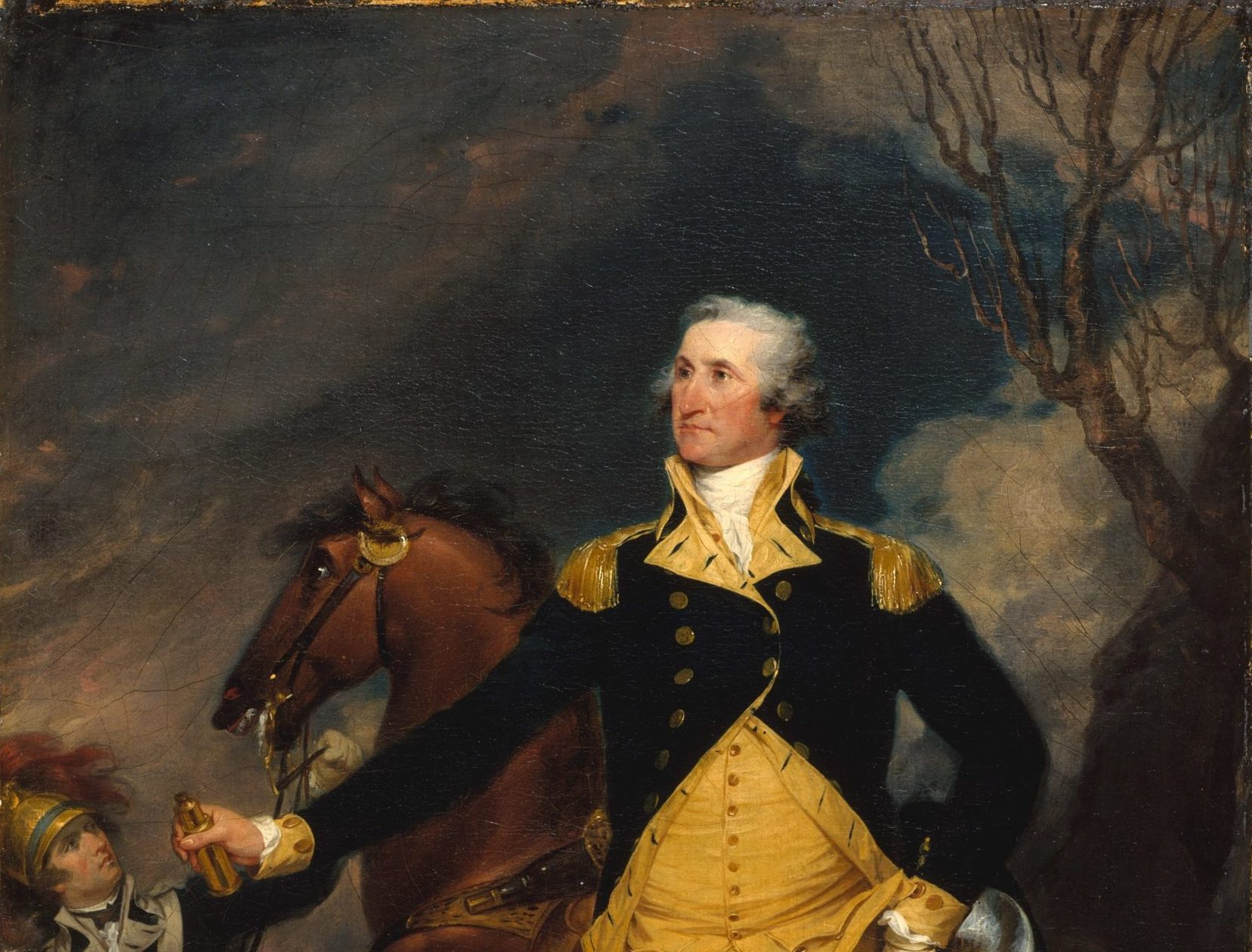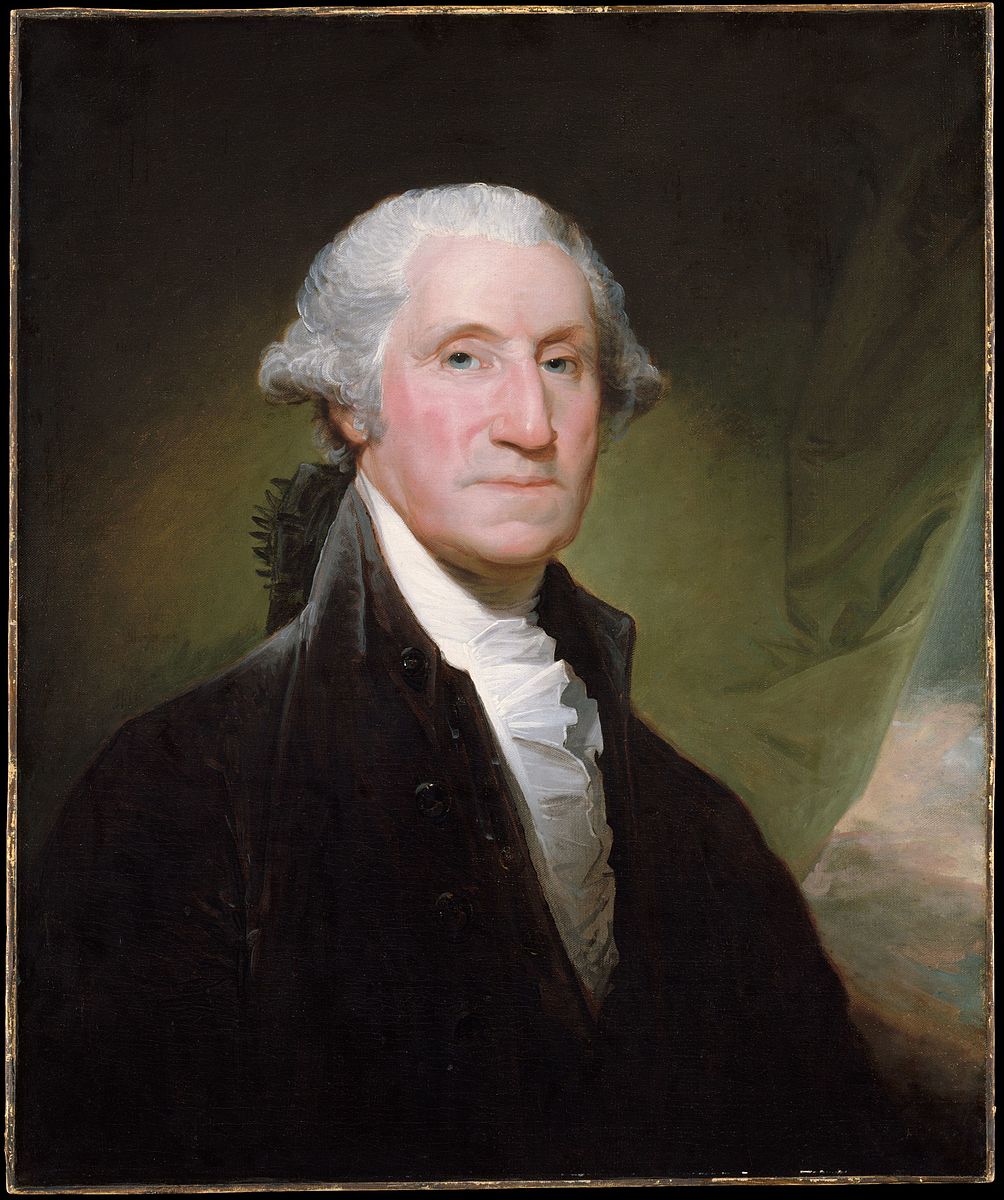 George Washington was born in Popes Creek, Westmoreland County, Virginia, on February 22, 1732 to Augustine and Mary (née Ball) Washington. Like many industrious American founders, Washington was largely self-educated. Early in his career, he was a surveyor and then volunteered to serve the British Army in the French and Indian War. Soon, he rose to the rank of lieutenant colonel and showed great bravery in battle. His courage resulted in him being given command of all of Virginia’s military forces. After, he served in the Virginia House of Burgesses from 1758-1776.
George Washington was born in Popes Creek, Westmoreland County, Virginia, on February 22, 1732 to Augustine and Mary (née Ball) Washington. Like many industrious American founders, Washington was largely self-educated. Early in his career, he was a surveyor and then volunteered to serve the British Army in the French and Indian War. Soon, he rose to the rank of lieutenant colonel and showed great bravery in battle. His courage resulted in him being given command of all of Virginia’s military forces. After, he served in the Virginia House of Burgesses from 1758-1776.
In 1775, Congress commissioned Washington to take command of the Continental Army. The warfare of the Revolution was like nothing he had experienced before, but he is credited with quickly devising bold military strategies that ultimately won the Revolution. After grueling years of war, he carried the nation to victory at the Battle of Yorktown in 1781 and resigned his commission in 1783.
Washington’s public duties were not yet over however – he found the Articles of Confederation ineffective and unsustainable and returned to public service in 1787, attending a convention preceding the Constitutional Convention, which he was chosen to preside over. Though he was not the most vocal participant, his opinions were greatly respected and sought after. He provided crucial support for the Constitution during the ratification process. Once the Constitution had been ratified, Washington was elected President unanimously.
As president, he set an ideal standard for all of his successors – Jefferson praised his impartiality and fairness in administration. He despised the partisanship that soon grew in government and set the precedent of a two-term limit in office. In 1796, Washington made his famous Farewell Address, finally withdrawing from government service and retiring to Mount Vernon. He died there on December 14, 1799.
Below is a collection of resources recognizing George Washington’s influence in American political thought and as the ultimate founding father. Browse these resources or jump from section to section by clicking the links below:
Washington’s Farewell Address, September 19, 1796
“…In looking forward to the moment which is intended to terminate the career of my public life, my feelings do not permit me to suspend the deep acknowledgment of that debt of gratitude which I owe to my beloved country for the many honors it has conferred upon me; still more for the steadfast confidence with which it has supported me; and for the opportunities I have thence enjoyed of manifesting my inviolable attachment, by services faithful and persevering, though in usefulness unequal to my zeal. If benefits have resulted to our country from these services, let it always be remembered to your praise, and as an instructive example in our annals, that under circumstances in which the passions, agitated in every direction, were liable to mislead, amidst appearances sometimes dubious, vicissitudes of fortune often discouraging, in situations in which not unfrequently want of success has countenanced the spirit of criticism, the constancy of your support was the essential prop of the efforts, and a guarantee of the plans by which they were effected. Profoundly penetrated with this idea, I shall carry it with me to my grave, as a strong incitement to unceasing vows that heaven may continue to you the choicest tokens of its beneficence; that your union and brotherly affection may be perpetual; that the free Constitution, which is the work of your hands, may be sacredly maintained; that its administration in every department may be stamped with wisdom and virtue; that, in fine, the happiness of the people of these States, under the auspices of liberty, may be made complete by so careful a preservation and so prudent a use of this blessing as will acquire to them the glory of recommending it to the applause, the affection, and adoption of every nation which is yet a stranger to it…”
Selected online resources on George Washington:
It’s Washington’s Birthday, Not Presidents’ Day
 Gleaves Whitney argues that celebrating Washington’s Birthday (as opposed to Presidents Day) would advance civic education and help inform children about one of our most important founders:
Gleaves Whitney argues that celebrating Washington’s Birthday (as opposed to Presidents Day) would advance civic education and help inform children about one of our most important founders:
“People ask why a few of us presidential junkies would like to see Presidents’ Day changed back to Washington’s Birthday. The technical explanation has to do with a misguided law called HR 15951 that was passed in 1968 to make federal holidays less complicated. The real answer is simply this: George Washington is our greatest president, and too few American children know why.
George Washington earned the respect even of his former enemy, King George III, by doing something exceedingly rare in history: When he had the chance to increase personal power, he decreased it — not once, not twice, but repeatedly. During the American Revolution, Washington put service before self. His personal example was his greatest gift to the nation. It has often been said that the “Father of our country” was less eloquent than Jefferson; less educated than Madison; less experienced than Franklin; less talented than Hamilton. Yet all these leaders looked to Washington to lead them because they trusted him with power. He didn’t need power.”
Read the entire article at the Imaginative Conservative >>
Washington and Hamilton: The Alliance That Forged America
The Constitutional Studies Program at the University of Notre Dame, a JMC partner program, presented, in recognition of Constitution Day 2016, “Washington and Hamilton: The Alliance That Forged America” by Stephen Knott, Professor of National Security Affairs, US Naval War College.
Click here to visit YouTube >>
The Washington Papers at the National Archives
 The National Archives has digitized its entire collection of the Washington Papers, making them available online. The Papers, spanning from 1747 to 1799, include diary entries, letters exchanged during the Revolutionary War, and accounts of Washington’s death.
The National Archives has digitized its entire collection of the Washington Papers, making them available online. The Papers, spanning from 1747 to 1799, include diary entries, letters exchanged during the Revolutionary War, and accounts of Washington’s death.
Explore the Washington Papers at the National Archives >>
Mount Vernon Online
 The Mount Vernon website contains several articles on Washington and his personal and political life. Sections of the website include “Youth,” “French and Indian War,” and “Slavery.” Mount Vernon also has an easily browsable Digital Encyclopedia of George Washington.
The Mount Vernon website contains several articles on Washington and his personal and political life. Sections of the website include “Youth,” “French and Indian War,” and “Slavery.” Mount Vernon also has an easily browsable Digital Encyclopedia of George Washington.
Click here to visit the Mount Vernon website and click here to explore the Digital Encyclopedia of George Washington >>
What So Proudly We Hail
 The What So Proudly We Hail online curriculum offers an ebook,“The Meaning of George Washington’s Birthday,” that reflects on the life and legacy of George Washington and why this founder in particular has a special place in American history.
The What So Proudly We Hail online curriculum offers an ebook,“The Meaning of George Washington’s Birthday,” that reflects on the life and legacy of George Washington and why this founder in particular has a special place in American history.
On the third Monday in February, Americans set aside a day to honor and celebrate the birthday of America’s first president. Or that’s the idea. Over time, the significance of the day has waned, as we now celebrate Presidents’ Day sales more than we do the presidents. And although the federal holiday remains “Washington’s Birthday,” the change in the popular conception of the day to “Presidents’ Day” has caused some confusion regarding whether we are honoring only Washington (and perhaps his fellow February giant, Lincoln), or all presidents, regardless of merit. So why should a nation that loves equality single out one man for special honors?
In this ebook, we examine the words and deeds of the “Father of Our Country” and consider the qualities of leadership needed for the flourishing of our nation. The first chapter explores the origins and traditions of celebrating George Washington’s birthday, dating from the very beginnings of our republic. The second chapter looks at the life and career of Washington: his early education and military career; his time taking command—and relinquishing it—during the Revolutionary War; and his leadership as America’s first president. The final chapter raises questions about how we, 200 years removed, are to remember Washington. Can we say with those who came before that Washington is, in the words of Henry Lee, still “first in war, first in peace, and first in the hearts of his countrymen”?
Read the ebook at What So Proudly We Hail >>
*If you are a JMC fellow who’s published on George Washington or his political thought, and would like your work included here, send it to us at academics@gojmc.org.
Commentary and articles from JMC fellows:
George Washington, Father of Our Country
William Allen, George Washington: America’s First Progressive. (Peter Lang, Inc., 2008)
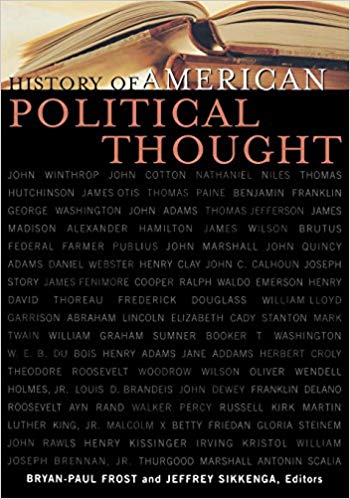 William Allen (editor), George Washington: A Collection. (Liberty Press, 1988)
William Allen (editor), George Washington: A Collection. (Liberty Press, 1988)
William Allen, “Jesus Walked on Water; George Washington Built on Land.” (Faith-Based, Not Bureaucracy-Bound: How Religious Institutions Can Fight Government Regulation, The Claremont Institute for the Study of Statesmanship and Political Philosophy, 2004)
Jeremy Bailey (co-author), “The Development of Unilateral Power and the Problem of the Power to Warn: Washington through McKinley.” (Presidential Studies Quarterly 43.1, March 2013)
Michael Breidenbach, “From Patriot to Lapel Pin: The Evocation of Patriotism in George Washington’s Farewell Address and the Modern Presidency.” (A Dialogue on Presidential Challenges and Leadership: Papers of the 2007-2008 Center Fellows, Center for the Study of the Presidency, 2008)
Paul Carrese, “American Power and the Legacy of Washington: Enduring Principles for Foreign and Security Policy.” (American Defense Policy, Johns Hopkins University Press, 2005)
 Paul Carrese, “George Washington’s Greatness and Aristotelian Virtue: Enduring Lessons for Constitutional Democracy.” (Magnanimity and Statesmanship, Rowman & Littlefield Publishers, 2008)
Paul Carrese, “George Washington’s Greatness and Aristotelian Virtue: Enduring Lessons for Constitutional Democracy.” (Magnanimity and Statesmanship, Rowman & Littlefield Publishers, 2008)
Paul Carrese, “George Washington’s Legacy as a Foreign Policy Guide.” (Public Discourse, October 22, 2012)
Paul Carrese, “The Grand Strategy of Washington and Eisenhower: Recovering the American Consensus.” (Orbis 59.2, Spring 2015)
Paul Carrese, “Liberty, Constitutionalism, and Moderation: The Political Thought of George Washington.” (History of American Political Thought, Lexington Books, 2003)
Paul Carrese (editor), The Life of George Washington: Special Edition for Schools. (Liberty Fund, 2000)
Robert Faulkner (editor), Life of George Washington. (Liberty Fund Press, 2000)
Robert Faulkner, “Washington and the Founding of Constitutional Democracy.” (Gladly to Learn and Gladly to Teach: Essays on Religion and Political Philosophy in Honor of Ernest L. Fortin, Lexington Books, 2002)
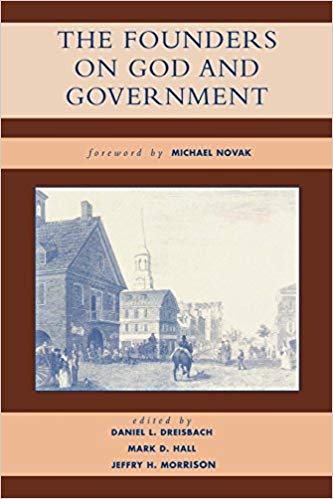 Mark David Hall (editor), The Founders on God and Government. (Rowman & Littlefield, 2004)
Mark David Hall (editor), The Founders on God and Government. (Rowman & Littlefield, 2004)
Charles Kesler, “Civility and Citizenship in Washington’s America and Ours.” (Imprimis 29.12, December 2000)
Shira Lurie, “Circular Letter to the States.” (George Washington Digital Encyclopedia, 2017)
Arthur Milikh, “Why We Should Celebrate Washington’s Birthday, Not Presidents Day.” (Daily Signal, February 17, 2017)
Vincent Phillip Muñoz, “George Washington on Religious Liberty.” (The Review of Politics 65.1, Winter 2003)
Vincent Phillip Muñoz, God and the Founders: Madison, Washington, and Jefferson. (Cambridge University Press, 2009)
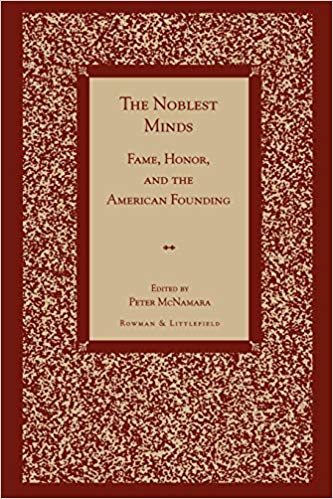 Vincent Phillip Muñoz, “Religion and the Common Good: George Washington on Church and State.” (The Founders on God and Government, Rowman & Littlefield, 2004)
Vincent Phillip Muñoz, “Religion and the Common Good: George Washington on Church and State.” (The Founders on God and Government, Rowman & Littlefield, 2004)
Lorraine Pangle (co-author), “George Washington and the Life of Honor.” (The Noblest Minds: Fame, Honor, and the American Founding, Rowman and Littlefield, 1999)
Thomas Pangle (co-author), “George Washington and the Life of Honor.” (The Noblest Minds: Fame, Honor, and the American Founding, Rowman and Littlefield, 1999)
Stephen Presser, “Would George Washington have wanted Bill Clinton impeached?“ (George Washington Law Review 67, 1999)
Nicholas Starr, “Competing Conceptions of the Separation of Powers: Washington’s Request for an Advisory Opinion in the Crisis of 1793.” (Presidential Studies Quarterly 45.3, September 2015)
*If you are a JMC fellow who’s published on George Washington or his political thought, and would like your work included here, send it to us at academics@gojmc.org.
![]()
![]() Follow us on Facebook and Twitter for updates about lectures, publications, podcasts, and events related to American political thought, United States history, and the Western tradition!
Follow us on Facebook and Twitter for updates about lectures, publications, podcasts, and events related to American political thought, United States history, and the Western tradition!
Want to help the Jack Miller Center transform higher education? Donate today.
